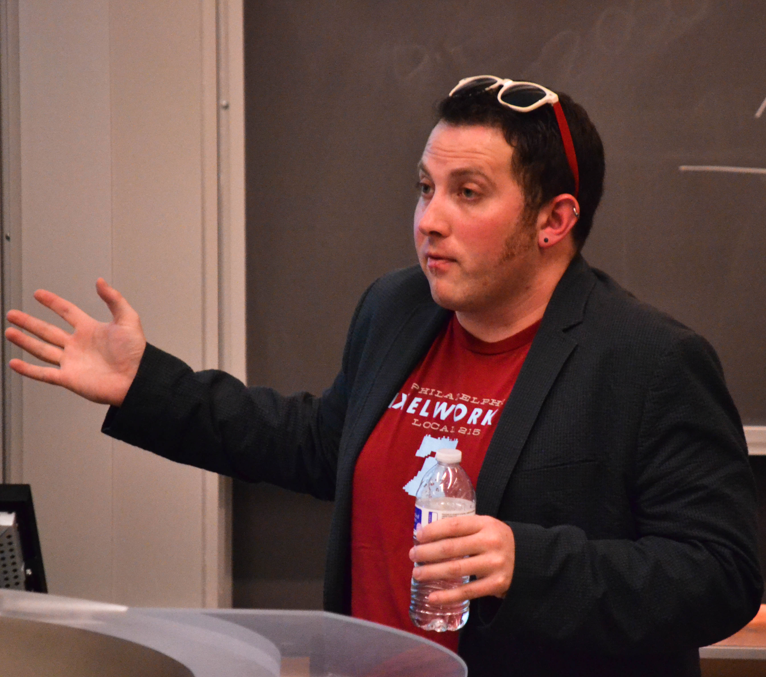For Paul R. Levy, the president and CEO of the Center City District, the transformation that area has experienced over the last 20 years has been a huge success story amid the backdrop of serious economic troubles. But not necessarily for the reasons you might think. It’s the outdoor cafes. All 213 of them.
“To me, that is the ultimate vote of confidence in downtown. People think it’s clean and safe,” he said.
Currently holding 214,433 jobs and paying over $12 billion in salaries annually, Center City relies primarily on the health care and education industries for the bulk of its economic drawing power, Levy said.. While not an alarming statistic on the surface, one need look no further than Detroit to determine what happens to a city that puts all of its progress behind a limited number of industries.
“We cannot rely on health care and education as the primary means of support,” Levy said.
So how about a move to the tech industry? Well, that’s a little easier said than done.
Around 40 percent of Center City’s job market is in the office sector, and of that number only about half of those jobs are in the tech services and information fields (admittedly broad categories that some say need updating). When combined with the knowledge that the district is facing a steady decline in office jobs, garnering less occupied office space — 88 percent — than in 1990, the challenge of moving the tech industry to Center City is compounded.
But with paperless electronic transfer company Neat Company recently making headlines for its decision to move its 52 employees from West Philadelphia’s University City Science Center to a 14,000-square-foot space on the 35th floor of Five Penn Center in mid-April, the tech industry’s hold on the area has increased.
“Center City provided a facility that matches the company,” said Neat Co. Chief Marketing Officer Kevin Garton in a recent interview with Technically Philly. “It fits the brand’s persona.”
Beyond that, said Garton, Center City also provides an easily navigable, commutable location that attracts more employees than other areas of the city and fits the overall needs of a growing company. Neat Co. is currently looking to add 25 employees to its roster, he added.
Cristina Greysman, director of business development at Farid Naib’s Document Depository Corp. agreed with Garton’s sentiment in a recent interview.
“There’s an aspect to our business that is security oriented, and we felt that having an address at 1500 Market St. helped provide us with some street cred,” Greysman said.
For DDC, which produces software for business finance management, its Center City location has also helped with the attraction of workers to their business because of the culture and nightlife of the area for prospective employees, she added.
While the district certainly has incentives to offer established technology companies like DDC and Neat Co., including tax breaks and an easy commute, tech startups are still largely absent from the area, with only a handful notable exceptions, like mobile payment companies XIPWIRE and Venmo.
The dearth of other notable examples is not only because of the city’s antiquated and highly prohibitive business and wage taxes.
Flowering Philadelphia success story SCVNGR, the mobile social gaming company behind the newly released application LevelUp, is looking to move out to Old City for an office space just above co-working pioneers Indy Hall on North Third Street.
While not opposed to Center City becoming a tech hub for the city, John Valentine, Philadelphia rewards leader at SCVNGR, believes there is a fundamental disconnect between the business culture of the district and the overall attitudes in and functionality of startup culture.

“There are no whiteboards in Center City,” he said. “At SCVNGR, we get a lot of our ideas from brainstorming and writing it down on a wall that we converted into a giant whiteboard.”
Essentially, that disconnect comes from the notion that startups, as the tattooed, scrappy younger brothers of older technology companies, operate in a much more nontraditional, creative model to generate their ideas that will later be built into products and services.
As a result, the traditional business culture of Center City—formal attire, cubicles and, gulp, Starbucks—fundamentally clashes with the free-spirited, foolhardy nature of the startup culture that encourages taking chances and being overtly unique.
But complaining about cubicles, said Indy Hall co-founder Alex Hillman, can often be a red herring.
“The cubicle is usually indicative of a bigger problem,” he said. “Most people just want better co-workers, not a better office space.”
The good news is that Philadelphia, through its abundant number of culturally distinct neighborhoods, offers areas that are suitable for any business personality. Other hotbeds of tech startup activity include Old City, flourishing Northern Liberties, a variety of South Philly pockets, and, well, with news of proposed cohousing space from Indy Hall, perhaps along the fringes of Fishtown and Kensington, which is also home to sustainable e-commerce platform Zecozi.
“Is Center City the end all be all for tech companies? No, but it is a good place for some companies,” said Gloria Bell of Philly Startup Leaders. “But the great thing about Philadelphia is that companies get to choose the area that fits their cultural environment.”







